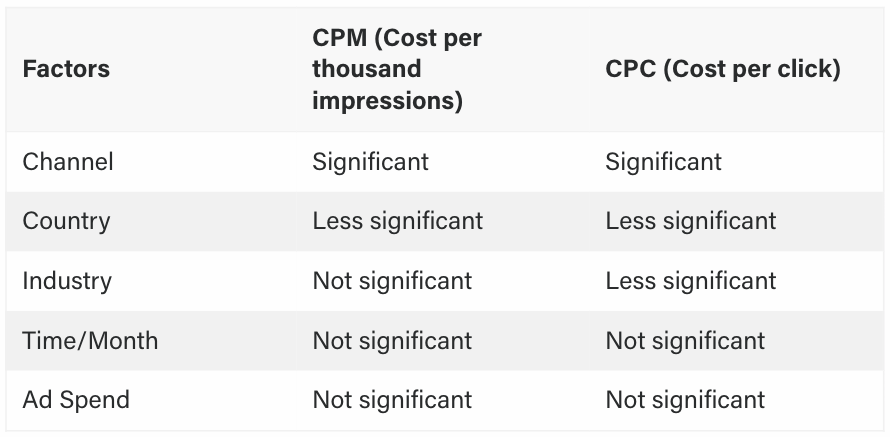If you have to choose between Facebook and Google Ads for promoting your SMB, Facebook is your best bet.
And in the debate between Microsoft Advertising and Google Ads, Google provides greater reach at a lower cost.
These are among the key findings of a new study by Cambridge University MBA students and ad platform Adzooma.
Participants analyzed how imagery, sentiment, and language impacted click-through rates (CTRs) on three top online ad platforms.
The study also considered whether landing page quality had an impact on conversion rates, and revealed new CPC and CPM benchmarks for Facebook, Microsoft, and Google Ads.
Which Factors Moved the Needle Most for Ad Performance
Researchers found that each of the major online ads platforms has its strengths:
- Facebook Ads was the most cost-effective channel on average.
- Microsoft Ads was most responsive to increasing ad spend.
- Google Ads had the greatest reach for the lowest cost.
In the evaluation of how factors impacted CPM and CPC, they found that an advertiser’s choice of channel has a significant impact on both metrics:
How CPM and CPC Differ on Facebook, Microsoft, and Google Ads
Upon determining this connection between channel and cost KPIs, researchers went looking for the average CPM and CPC across Google, Facebook and Microsoft Ads:
Microsoft Advertising had the highest median CPM and CPC, but researchers advise it is best for targeting affluent customers.
This is because 54% of Bing users are over the age of 45, and a third of them have a household income of over $100,000.
How Increasing Ad Spend Impacts ROAS
It’s a common problem in digital advertising—spending too much is wasteful, yet spending too little may not generate the return you need.
In this portion of the study, researchers used regression analysis to determine whether increasing ad spend also increases the number of impressions and clicks.
Here’s what they found:
Microsoft Advertising showed the greatest ROAS for increasing budget in terms of impressions, a good metric for brand awareness campaigns.
However, all three platforms performed similarly in terms of increased clicks, with Microsoft and Google Ads just slightly ahead of Facebook Ads.
How Sentiment Impacts Ad Performance on Google and Microsoft Ads
Researchers found ads with positive sentiment performed best on Microsoft Ads, where CTRs were:
- 4.2% for positive ads
- 3.6% for neutral ads
- 3.3 for negative ads
The opposite was true on Google Ads, where negative sentiment won the day with CTRs of:
- 6.5% for negative ads
- 5.7% for neutral and positive ads
Study participant Sunil Grewal, formerly of Amazon, said:
“Based on the analysis, the users of different advertising platforms have different responses to ad copy sentiment.”
This is important, he explained, because advertisers can optimize their return on ad spend (ROAS) by refining ads to capitalize on the impact of sentiment.
Landing Page Quality Had Greatest Impact on Conversion, Yet Few Excel Here
Srishti Warman, formerly an associate VP at Barclays Bank and an MBA Star winner at the Women of the Future Awards, was responsible for the study’s landing page analysis.
She explains:
“The task was to identify the key parameters that lead to a higher conversion e.g. faster page speed, better optimisation for mobile and web viewing, page responsiveness, etc. This analysis would eventually help understand not only which companies scale quickest within verticals, but critically, why.”
Subscribe for Daily Search Insights
AI, PPC, and digital marketing news distilled to fuel success. Join the other 75k marketers!
Warman found that although landing page best practices had the greatest impact on conversion rate, not a single one of those tested had perfect score for best practices in Lighthouse.
These best practices included using HTTPS, displaying images with correct aspect ratios, serving images with appropriate resolution, and avoiding a request for location on page loading.
Only 5% of landing pages had a perfect score for website performance checks.
That means that 95% of businesses are leaving money on the table.
Warman also noted that she was surprised to see that optimization best practices outperformed page loading speed as the most important factor in driving conversions.
In addition to the primary landing page factors studied—best practices, SEO, performance, and accessibility—Warman identified content quality, CTAs, and the PPC to landing page journey as impactful for improving conversion.
Key Takeaways from Facebook Ads v. Microsoft Advertising v. Google Ads Comparison
- Facebook is, on average, the most cost-effective channel for SMBs.
- Ads with positive sentiment perform better on Microsoft, and negative sentiment performs better on Google Ads.
- Best practices were the most important conversion element for landing pages, followed by SEO (titles and meta descriptions, valid robots.txt, ensuring links are crawlable, etc.).
- Very few advertisers are maximizing their conversion opportunities, leaving plenty of opportunity to improve ROAS through landing page optimization.
Methodology:
Study participants were given access to anonymized campaign data from the Adzooma platform, selected at random and spanning thousands of accounts and a variety of industries.
Participants used Lighthouse to evaluate landing page quality, as well as SEMrush, Screaming Frog, Adzooma, and Google Analytics.
Sources:
- What Makes Online Marketing Work: Cambridge Uni x Adzooma
- How To Choose The Best Digital Marketing Channel: Cambridge Uni x Adzooma
- Media release: Adzooma and Cambridge University reveal insightful data on how to succeed in online marketing in 2021
Image source: All screenshots by author, February 2021





